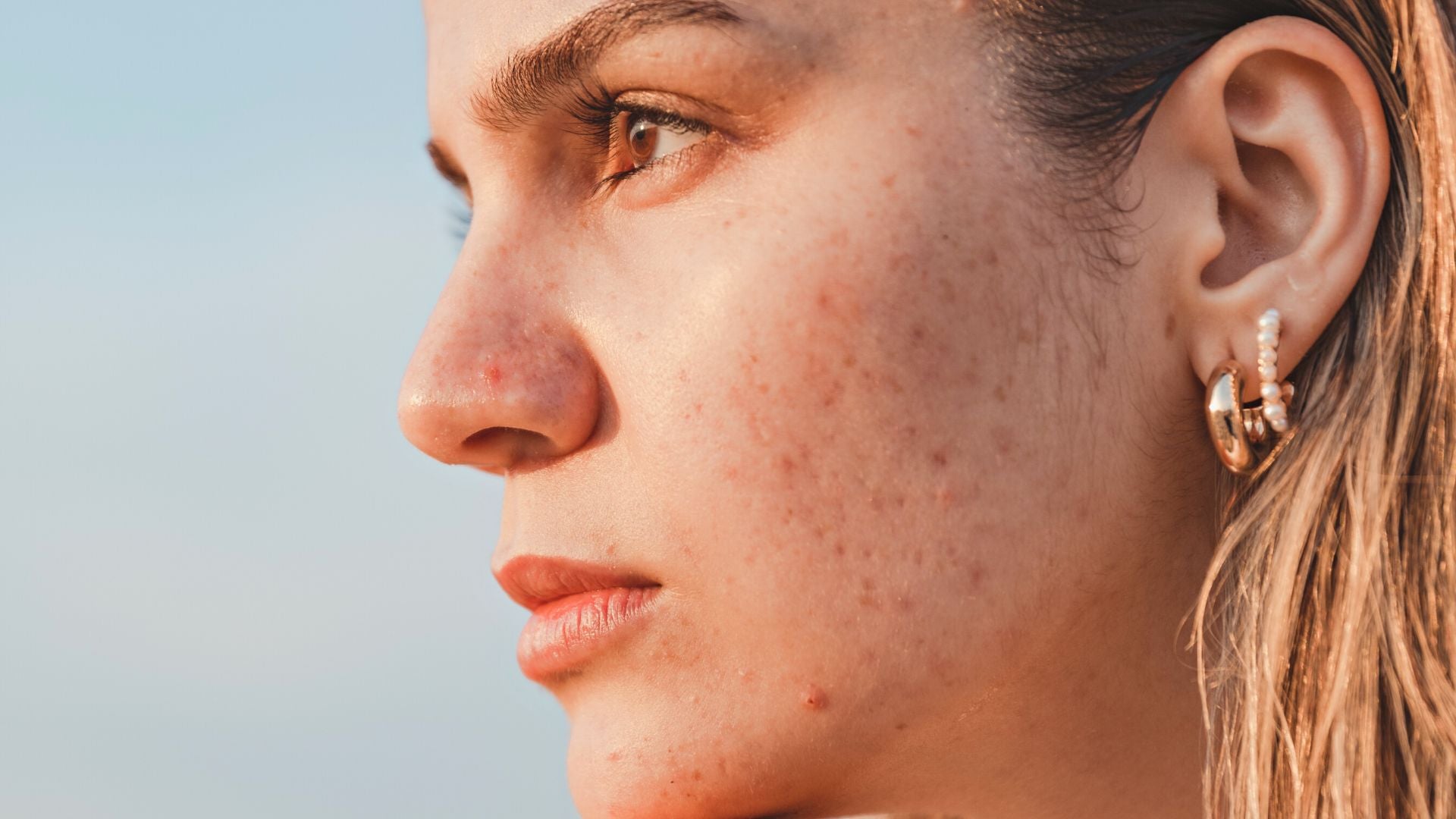
There's nothing worse than getting ready to start your day and finding a shiny new pimple in the middle of your forehead.
Sometimes, the causes of acne can feel like a bit of a mystery. There are lots of myths and misconceptions about what actually makes you break out. One common question that many have asked is: does sunscreen cause acne?
In this article, we'll explore everything you need to know about sunscreen and acne (and some good alternatives for it).
Keep reading to learn more...
Does Sunscreen Cause Acne?
The quick answer is — yes. Many sunscreens do cause acne by clogging your pores. Among the many myths about sunscreen, this one is (mostly) true.
There are certain types of sunscreens that have chemicals that irritate your skin, which can make you more susceptible to breakouts. These pore-clogging ingredients are what we call comedogenic.
Not only does it clog your pores, but there are other mechanisms of sunscreens that can cause breakouts in other ways. For example, chemical sunscreens absorb UV light into your skin. Your body then converts this into heat, which the body releases.
This can make you sweat more. At the same time, the chemical ingredients in these sunscreens trap sweat in your skin. This can further irritate your skin and cause more acne.
In addition, improper storage can cause the chemicals to break down, leading to more breakouts. If you leave it in a hot car or even in the sun by the pool, this can cause instability in the ingredients.
Is the Sunscreen I'm Using Causing Acne?
Now that you know that sunscreen does clog pores, you're probably wondering if the sunscreen you use is bad for your skin.
First, it's important to take a look at the ingredients in your sunscreen. Remember that acne is typically caused by build-up on the skin like oil, dirt, sebum, and more. These ingredients can make the situation worse.
Try to avoid sunscreens with these ingredients:
Comedogenic Oils and Butters
Many sunscreens contain things like soybean oil, coconut oil, wheat germ oil, and cocoa butter. Even though these are natural ingredients, they do still clog your pores. Some good alternative ingredients to these are rosehip seed, sea buckthorn, grapeseed oils, sunflower, and jojoba.
Mineral Oils and Silicones
These ingredients can trap sweat that is trying to leave your pores. This causes dirt to stay in the pores, causing breakouts.
Benzophenones
These are what help filter UV in many types of sunscreens. Oxybenzone and avobenzone are the most common ones. They can cause skin allergies, leading to more breakouts.
PABA and Other Chemicals
Para-aminobenzoic acid (PABA) is also another known cause of acne. Some other chemicals that can irritate the skin include:
- Isopropyl myristate
- Isopropyl isostearate
- Isopropyl neopentanoate
- Decyl oleate
- Myristyl myristate
- Myristyl propionate
- Butyl stearate
- Isopropyl palmitate
- Octyl stearate
- Octyl palmitate
- Peppermint oil or propylene glycol-2 (PPG-2)
Beeswax and Other Waxes
Beeswax and plant waxes are usually great for the skin. Most skin types are fine when these are applied, but those with very sensitive or acne-prone skin might want to avoid them, as these waxes can also clog the pores.

How to Choose the Best Sunscreen For Your Skin
Here's the good news: not all sunscreen is bad for your skin. There are many different types of sunscreen with that are important for your skin, including:
- Protecting your skin against harmful UV rays
- Keeping your complexion even
- Helping against premature ageing
- Reducing the risk of cancer
So how can you find a sunscreen that doesn't clog pores? Let's look at a few tips.
Look For "Non-comedogenic" and "Oil-free"
As mentioned earlier, comedogenic means that it clogs pores, so find ones that say they are non-comedogenic. This means that the product doesn't include any extra ingredients that might cause breakouts. Using oil-free sunscreen can also help make your skin more oil-free.
Avoid Oxybenzone and PABA
Oxybenzone and PABA are two ingredients you'll want to stay away from if you have sensitive or acne-prone skin. Try to stick to mineral sunscreens that have zinc oxide or titanium oxide. These don't irritate the skin.
Use a Day Cream With SPF
No matter what skin type you have, you need to make sure your skin is moisturised. Using a day cream with SPF is a great way to get protection from UV rays while keeping your skin hydrated.
This means you won't have to layer your skin with two different creams, which gives your pores more room to breathe.
Use a Tinted Sunscreen
If you have oily skin or use a lot of makeup, using a tinted sunscreen is a great alternative to acne-inducing sunscreens. These combine broad-spectrum mineral UV filters like titanium oxide and Zinc oxide to reflect away light.
Look for Anti-Inflammatory Formulas With Niacinamide
Niacinamide has anti-inflammatory properties that can help prevent further acne breakouts. One study shows that niacinamide lowers the number of pustules and comedones, which are two types of acne caused by sunscreen.
Use Mineral Sunscreen
As mentioned earlier, chemical sunscreens make you sweat more but trap that sweat in your skin, which causes your pores. Mineral-based sunscreens, on the other hand, use ingredients like Zinc which allow your skin to breathe much better.
Protect Your Skin With Skin-Loving Sunscreen
So does sunscreen cause acne? The real answer is most of them do, but certain types of sunscreens are safe for all skin. People4Ocean uses only ingredients that hydrate your skin while giving it the UV protection it needs to keep you safe.
We leave out all harmful ingredients, perfumes, and alcohol that most other sunscreens use. Instead, we include nutrient-rich creams, moisture-locking ceramides, and potent anti-oxidants to repair and regenerate the skin.
If you're tired of using sunscreens that cause acne breakouts, stop settling for unnatural, sweat-trapping ingredients. Protect and nourish your skin and check out our products today!


Comments (0)
Back to Blog